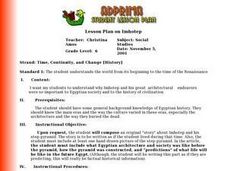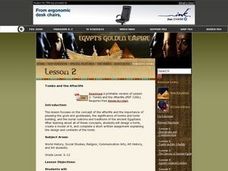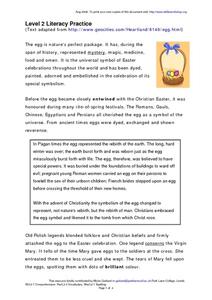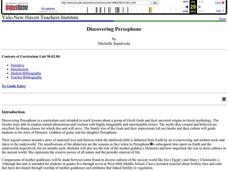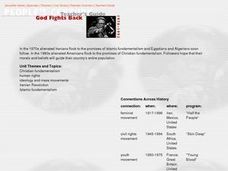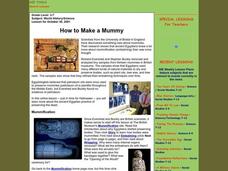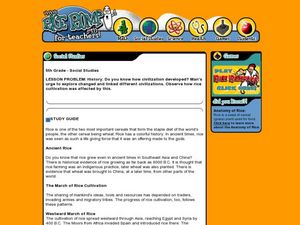Curated OER
The Chinese Produce Paper as We Know it Today
Tenth graders explore where paper originated and its importance from the Chinese to the rest of the world. They list ten ways that they use paper on a daily basis and rate that use on a scale from one to ten. Each group also brainstorms...
Curated OER
Imhotep
Sixth graders compose an original story about Imhotep and his step-pyramid. They also must include what Egyptian architecture and society was like before the pyramid, how the pyramid was constructed and predictions of what life will be...
Curated OER
Good Heavens
Students look at the history of science to identify some of the scientific ideas that different cultures have contributed to science throughout history. They describe using examples ideas developed by different cultures to explain the...
Curated OER
Anasazi Basket Weaving: 0-500 A.D.
Sixth graders study Period 1- Basket Maker 0-500 A.D. of Anasazi Culture. They identify the sequence of history in Anasazi Culture and Indians of the Mesa Verde. They discover American Indian contributions to the world and develop...
Curated OER
Anasazi Pueblo Period: 700-1050 A.D.
Sixth graders study Period 3-Developmental Pueblo 700-1050 A.D., of Anasazi culture. They identify the sequence of history in Colorado and recognize American Indian Contributions to the world. They study Indians of the Mesa Verde and...
Curated OER
Tombs and the Afterlife
Students design a tomb, create a model of it, and complete a short written assignment explaining the design and contents of the tomb. They study the concept of the afterlife and the importance of pleasing the gods and goddesses.
Curated OER
The Egg and Symbolism with the Christian Easter
In this language arts and religion worksheet, students read an informative page about the symbolism of the egg in the Christian Easter. Students answer 6 questions. This page is from the UK.
Curated OER
Water and Shalom
Students discover main functions and importance of water in Biblical times. In this water in Biblical times lesson, students discuss prior knowledge and read Bible passages to find ways that water was valuable in Bible times. ...
Yale University
Discovering Persephone
Here is a resource that introduces learners to how the stories from Greek mythology explain the workings of natural phenomena, movements of the seasons, and how the conflicts of the gods mimic our own daily difficulties. Learners...
Curated OER
God Fights Back
Students view a television program tracing religious fundamentalism in Iran and the United States. They participate in a discussion exploring the similarities of fundamentalism in different religions and cultures and outline the goals...
Student Handouts
What Year Is It?
This page includes a space to write in the date, but what does the date even mean? And where does it come from? Inform your class about the various calendars and how the Western calendar came into widespread use with an informational...
Curated OER
You Either Know It Or You Don’t!
In this research skills worksheet, students research the answers to fifteen questions that involve all the subjects across the board.
Curated OER
New Perspectives
Eighth graders imagine they are getting ready to "take off." They may imagine themselves in any type of aircraft or spaceship. They may then sketch themselves as passengers anticipating this moment.
Curated OER
Making Peace
Students examine how African societies view their family and ancestors and settle disputes. They create a spirit doll, and role-play conflict resolution using the ancestor figure dolls.
Curated OER
You Either Know it or You Don't 5
In this Internet research skills worksheet, students respond to 15 short answer trivia questions. Students may use reference sources if they don't know the answers.
Curated OER
Guidelines for Governing: Utopia and The Prince
Students explore the power of the Church in government. In this literature lesson, students read Sir Thomas More's Utopia and Niccolo Machiavelli's The Prince. Students respond to questions regarding the works and discuss them.
Curated OER
Hieroglyphics: It's Not Greek To Me! (It's Egyptian)
Students identify different hieroglyphic characters. They spell their name and write a sentence using them. They use online hieroglyphic translators as well.
Curated OER
The Art of the Quilt
Students examine why fabric was first sewn in layers and how it was used. They identify, compare and make 3 different fabric design types which will become a basis for looking at the quilts created by African Americans. They begin the...
Curated OER
How To Make a Mummy
Students explore the process of mummification through a British website. They read about why the process began and how it is done. They can follow along in the process in how to make a mummy as well.
Curated OER
Christmas Lesson Plans
Students learn about the Christmas season through music, research, and other activities.
Facing History and Ourselves
What Does It Mean to Belong?
After reading and analyzing The 'In' Group by Eve Shalen, sixth graders consider how the categorization of people results in exclusion, discrimination, and injustice.
Curated OER
Developing Civilizations and the Role of Rice
Student investigate how civilizations developed. In this rice farming lesson plan, 5th graders explore how rice cultivation changed through different civilizations. Students gain knowledge about different types of rice, where it's grown...
Curated OER
Alexander the Great
In this Alexander the Great worksheet, students answer multiple choice questions about Alexander the Great and the time he lived. Students answer 12 questions total.
Curated OER
Using Evidence from a Shipwreck to Explore Late Bronze Age Trade in the Mediterranean
Students examine a shipwreck from the late Bronze Age. As a class, they view a variety of slides to describe the cargo and examine the artifacts found on the wreckage. They discuss what each object tells them about the crew and the time...



